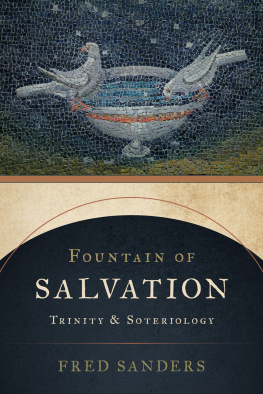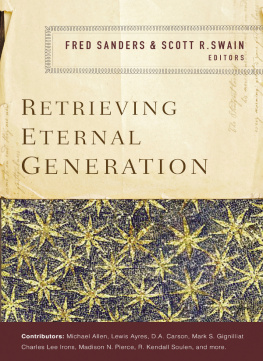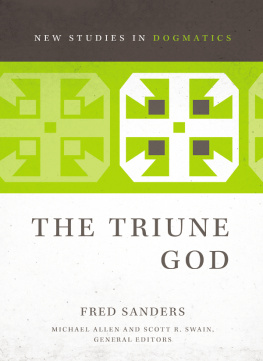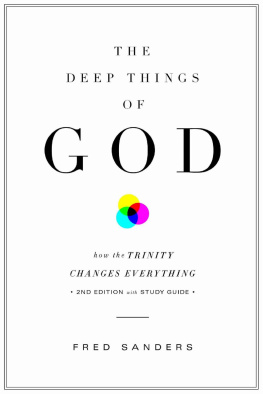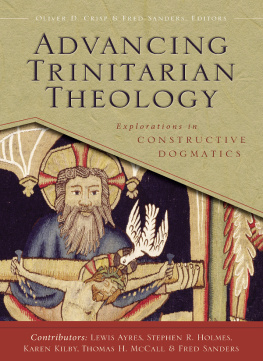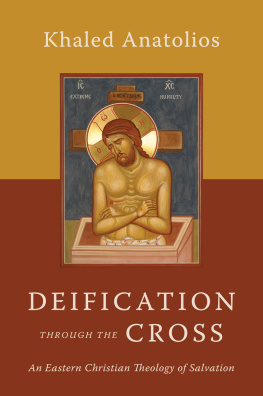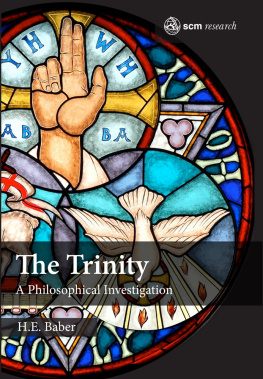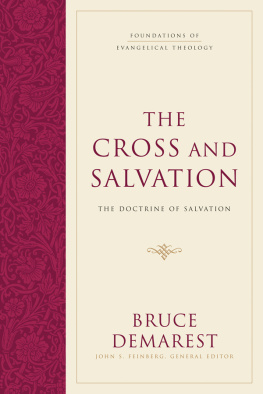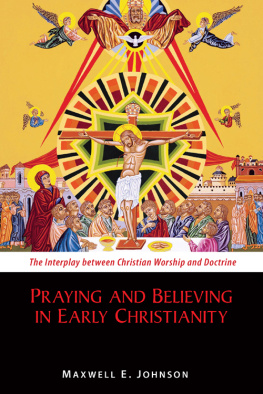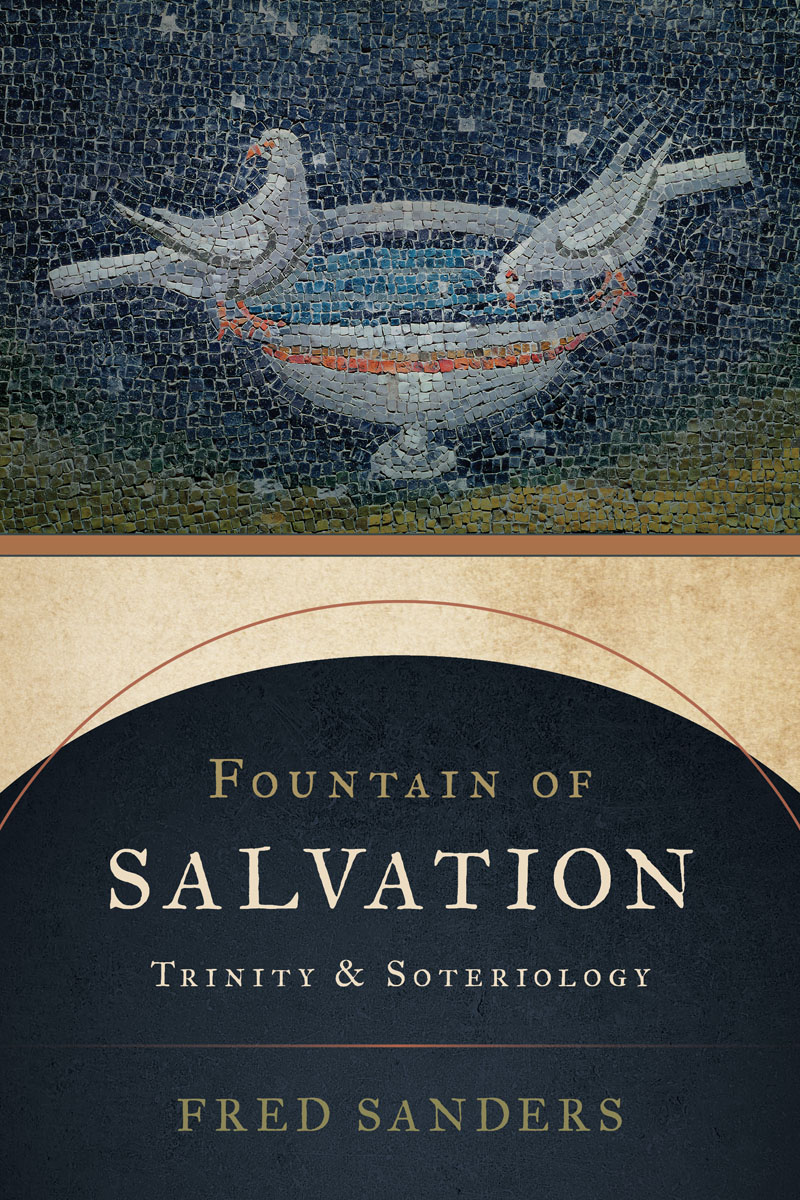
Professor Sanders is one of the most sophisticated and historically sensitive contemporary theologians. In this volume he brings his considerable acumen to bear on the relation between the doctrine of the Trinity and the scope and content of salvation. The result is a tour de force that demonstrates the fecundity of trinitarian theology for the church and the Christian life. An impressive achievement.
Oliver D. Crisp
University of St. Andrews
To paraphrase Kant: the Trinity without salvation is empty, an intimidating abstraction; salvation without the Trinity is blind, an inexpressible experience. Sanders here strikes the perfect balance between the triune God of the gospel and the gospel of the triune God, offering a compelling argument for both their proper distinction and their proper relation. Thanks to this Fountain of Salvation, my cup of theology runneth over. I cant wait to assign this refreshing cup of cold water to my students.
Kevin J. Vanhoozer
Trinity Evangelical Divinity School
In Fountain of Salvation, Fred Sanders offers a wonderful introduction to the Trinity as the object of Christian worship and as a belief inseparable from and indeed structuring the doctrine of salvation. He then leads us clearly, interestingly, and dependably through recent theological debates on this fundamental Christian belief, always showing us where (and where not) those debates really do enable Christians to grow in knowledge of the Triune life. Across Christian traditions Sanderss argument should resonate and inspire.
Lewis Ayres
Durham University
In Fountain of Salvation, Fred Sanders continues, interrogates, and extends the modern program of reflecting on the being of the triune God in light of the history of salvation. Ever on guard against reducing the being of God to his works, Sanders analyzes topics as diverse as atonement, church, Christian life, and theological education through the bifocal lens of Trinity and salvation. The result is a work of subtle judgment and profound insight, exactly what one would expect from our most gifted theologian of the Trinity.
Scott R. Swain
Reformed Theological Seminary, Orlando
In this characteristically insightful work, Fred Sanders illumines the deep and inextricable connections between the doctrine of the Trinity and the doctrine of salvation. Treading a difficult path through the theological temptations and perils on either side, he sets out a sound programmatic agenda for constructive Trinitarian thinking today. Deeply rooted in Scripture and widely informed by tradition, this volume is a welcome and salutary addition to the shelves of both theologians and pastors.
Paul T. Nimmo
University of Aberdeen
Wm. B. Eerdmans Publishing Co.
4035 Park East Court SE, Grand Rapids, Michigan 49546
www.eerdmans.com
2021 Fred Sanders
All rights reserved
Published 2021
Printed in the United States of America
27 26 25 24 23 22 21 1 2 3 4 5 6 7
ISBN 978-0-8028-7810-6
Library of Congress Cataloging-in-Publication Data
Names: Sanders, Fred (Fred R.), author.
Title: Fountain of salvation : trinity & soteriology / Fred Sanders.
Description: Grand Rapids, Michigan : William B. Eerdmans Publishing Company, [2021] | Includes bibliographical references and index. | Summary: A soteriology expounded through the lens of trinitarian theologyProvided by publisher.
Identifiers: LCCN 2021009211 | ISBN 9780802878106 (paperback)
Subjects: LCSH: Trinity. | SalvationChristianity.
Classification: LCC BT111.3 .S274 2021 | DDC 234dc23
LC record available at https://lccn.loc.gov/2021009211
Unless otherwise indicated, Scripture quotations are from the ESV Bible (The Holy Bible, English Standard Version), 2001 by Crossway, a publishing ministry of Good News Publishers. Used by permission. All rights reserved.
Scripture quotations marked (NIV) are taken from the Holy Bible, New International Version, NIV. 1973, 1978, 1984, 2011 by Biblica, Inc. Used by permission of Zondervan. All rights reserved worldwide. www.zondervan.com. The NIV and New International Version are trademarks registered in the United States Patent and Trademark Office by Biblica, Inc.
To my mom
Contents
Behold, God is my salvation;
With joy you will draw water from the fountain of salvation.
Isaiah 12:23 (authors translation)
INTRODUCTION
The Gospel of God
C ALVIN FAMOUSLY OPENS his Institutes with the observation that all true and sound wisdom consists in knowledge of God and knowledge of the self. But which one precedes and brings forth the other is not easy to discern, He invites us to consider the problem of how these two matters are related to each other just so he can engage our minds simultaneously in the contemplation of them both.
With slight adjustments, we can say that the same complex relationship obtains between the doctrine of the Trinity (as knowledge of God) and the Christian doctrine of salvation (which stands here as knowledge of self). The two arise together from the scriptural testimony, because the Bible consistently speaks of salvation and of God together. In particular, the revelation of the triunity of God is tightly bundled with the fulfillment of Gods promises in the gospel, and it is the Fathers sending of the Son and the Holy Spirit that accomplishes at the same time the revelation of God as Trinity and the particular salvation accomplished by these three as one.
T HE T RIUNE G OD AND S ALVATION
This book is concerned with exploring and specifying precisely that relation between the Trinity and salvation. The presupposition of everything in the following chapters is that a great deal is at stake for theology and the Christian life in grasping this relation correctly. If the two doctrines are only connected loosely, both suffer. The doctrine of the Trinity, presented without reference to soteriology, begins to seem altogether irrelevant, floating away into a conceptual stratosphere as something that may be true but cannot be significant. The doctrine of salvation meanwhile, treated in isolation from the doctrine of the immanent Trinity, sinks down to the level of mere history and experience, losing its transcendent reference. Therefore these doctrinal complexes must be connected. On the other hand, if they are drawn together too tightly, human salvation begins to seem inherent to the divine reality itself, as if God has no other business but to save, no other being than being savior. The godness of God is in danger, in this case, of being eclipsed by the dynamics of salvation. The more classical, lofty, or austere a doctrine of the triune God is, the more it seems immune from being dissolved into soteriology. Christian theology ought to be an exercise in knowing God precisely as the God of salvation. But we have not confessed the God of salvation at all if we have not confessed Gods perfection and self-sufficiency apart from any considerations about salvation. As Karl Barth asked, What would God for us mean if it were not said against the background of God in Himself?
In the comings and goings of recent academic theology, it is roughly fair to say that a great deal of theological excitement was generated by a recovery of the soteriological side of this equation in the late twentieth century, after which a kind of correction set in to recover the side of the equation devoted to God
Next page
